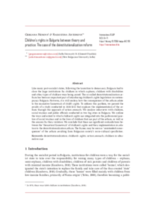In this article, the authors aim to analyse how the process of deinstitutionalization in Bulgaria relates to the concept of child’s rights articulated in the CRC on which it is based. They focus on children without disabilities, specifically children raised in small home centres (SHC2) subject to so-called residential care. They seek an answer to the following questions – to what extent has the DI reform led to the actual provision of rights to children previously raised in institutions? What are the most common challenges and difficulties the different actors face regarding understanding, interpreting and implementing the child’s rights framework? Their central claim is that the case of the deinstitutionalization reform in Bulgaria is an example of the significant contradictions between the ‘theoretical framework’ of children’s rights and their implementation. Within the context of a post-socialist country with high levels of poverty, these contradictions are evident, highly pronounced and problematic.
Abstract:
Like many post-socialist states, following the transition to democracy, Bulgaria had to close the large institutions for children in which orphans, children with disabilities and other types of children were being raised. The so-called deinstitutionalization reform has been an important part of introducing children’s rights legislation in contemporary Bulgaria. However, it is still unclear how the consequences of the reform relate to the normative framework of child’s rights. To address this problem, the authors present the results of a study conducted in 2020/2021 that explores the implementation of the reform through the approach of action research. They analyse interviews with children, social workers and public officials conducted in two big cities in Bulgaria. They outline the ways and extent to which children’s rights are integrated into the professional practice of social workers and in the lives of children that are part of the reform, as well as the reasons for their violation. They conclude that there are significant contradictions between the ‘theoretical framework’ of children’s rights and their implementation in relation to the deinstitutionalization reform. The former may be seen as ‘unintended consequences’ of the reform resulting from Bulgarian society’s socio-cultural specificities.

